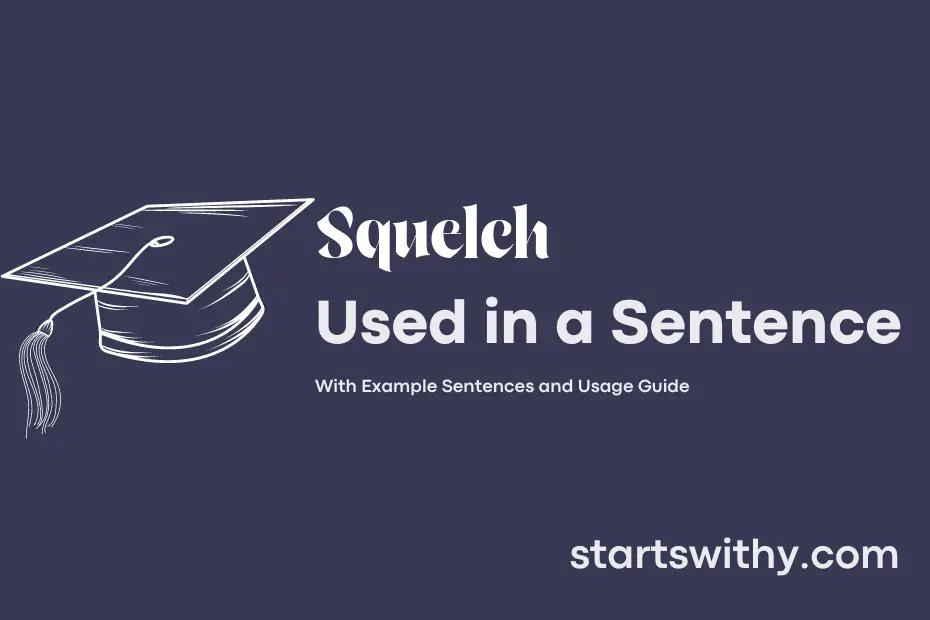Have you ever experienced a moment of silence following the squelch of your wet shoes on a rainy day? A squelch is a wet, sucking sound made when something soft and wet is stepped on or crushed.
It is often heard when walking on muddy ground or when squeezing a wet sponge. The distinct sound of a squelch can evoke feelings of dampness and discomfort, making it a unique auditory sensation.
7 Examples Of Squelch Used In a Sentence For Kids
- The squelch of raindrops made a funny sound.
- I like to squelch in puddles after it rains.
- The mud squelched under my boots as I walked.
- Can you hear the squelch of the wet sponge?
- The squelch of the wet sand felt funny between my toes.
- I heard a loud squelch when I stepped on a slug.
- Let’s see how many times we can squelch on our walk today!
14 Sentences with Squelch Examples
- Squelch those negative thoughts and stay focused on your studies.
- Don’t let the rain squelch your plans for the weekend!
- The professor’s explanation of the concept helped squelch my confusion.
- I had to squelch my excitement when I received my exam results.
- Squelch the urge to procrastinate and start working on your assignments.
- The loud music from the nearby party could be heard even through the closed windows, but a sudden clap of thunder squelched the noise.
- I had to squelch my desire to splurge on unnecessary items and stick to my budget.
- Squelch the fear of failure and give your best shot in the upcoming exams.
- The gossip about the new student spread quickly through the college, but a stern look from the professor squelched any further discussion.
- Squelch the temptation to skip your morning classes and get up on time.
- The cafeteria’s attempt at serving healthy food was squelched by the demand for fast food by students.
- I tried to squelch my laughter during the serious presentation in the class.
- The power outage in the college temporarily squelched all electronic devices.
- The idea of a group study session to squelch the confusion about the assignment was well-received by the students.
How To Use Squelch in Sentences?
Squelch means to suppress or silence something, usually a sound or noise. When using squelch in a sentence, consider the following:
-
Identify the specific sound or noise that you want to suppress. For example, “I had to squelch the urge to laugh during the serious meeting.”
-
Place the word squelch in your sentence in a way that shows it is being used to quiet or stifle something. For instance, “She tried to squelch her excitement so as not to spoil the surprise.”
-
Make sure the context in which you use squelch makes sense and conveys the desired meaning. Avoid using it in a way that may confuse the reader. For example, “The teacher had to squelch her anger when the students misbehaved.”
-
Remember that squelch is not commonly used in everyday language, so using it in a sentence might initially sound unfamiliar to some. You can provide some context or explain the meaning if necessary.
Incorporating squelch in a sentence can add depth to your language and provide a more nuanced way of expressing yourself. Practice using squelch in various situations to become more comfortable with its usage and expand your vocabulary.
Conclusion
In conclusion, the use of “squelch” in sentences typically refers to the act of suppressing or silencing something, such as a noise or discomfort. For example, “She tried to squelch her nervousness before the presentation,” illustrates the effort to quell or contain feelings of anxiety. Similarly, “The rain squelched the sound of footsteps” portrays the dampening or stifling of a sound by a different noise. Whether describing the act of stifling an emotion or muting a sound, sentences with “squelch” demonstrate the concept of restraining or suppressing something.
Overall, sentences featuring “squelch” highlight the action of subduing, extinguishing, or inhibiting various elements. Through these examples, the term “squelch” effectively conveys the idea of quieting or controlling something, making it a versatile word in the English language for describing the act of suppressing or stifling.



